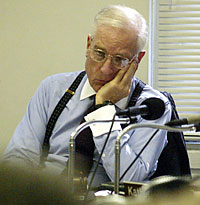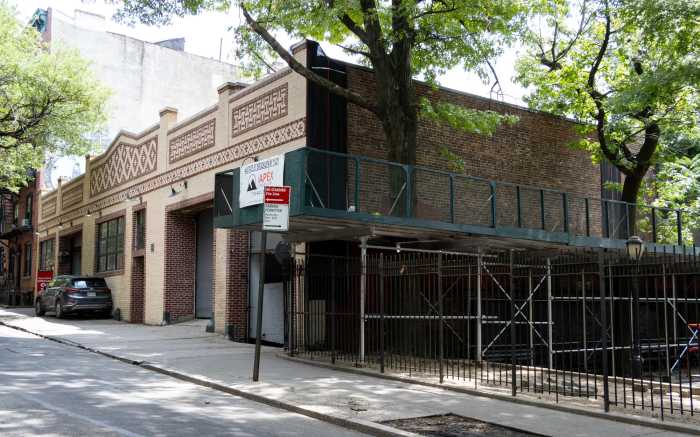As it once was, so it shall be again, the Metropolitan Transportation
Authority board decided this week, when it cast aside the high bidder
— who offered $150 million to develop the Long Island Rail Road storage
yards at Atlantic Avenue — and instead voted to continue their exclusive
negotiations with preferred developer Forest City Ratner.
The MTA board voted 11-1 on Wednesday to approve a resolution calling
for exclusive negotiations with developer Bruce Ratner’s company,
with the hopes of upping its bid by the board’s Sept. 29 meeting.
Ratner’s bid offers $50 million up front. It also includes $29 million
in renovations of the rail yards (to help pay for the relocation of them
required by Ratner’s plan), $20 million in environmental remediation
of the land (which needs to be done in order to develop the site for housing),
$182 million to build a platform (to build the housing and commercial
properties over the shifted rail yards), $25.4 million in MTA operating
expenses and $23 million in new sales tax revenues.
The other bidder, Extell Development Company, submitted a $150 million
bid.
MTA Chairman Peter Kalikow said at the July 27 meeting that neither bid
came close enough to the state authority’s $214 million appraised
value for the rail yards to justify the board’s interest.
Compared to Ratner’s bid — which was two years in the making
and included dozens of support letters from elected officials, a myriad
of minority contracting organizations and numerous labor unions, the Extell
bid — hastily prepared to meet the MTA’s one-month deadline
— was presented on standard-sized sheets of paper with far fewer
support letters and little analysis of the benefits.
At the board meeting, held at the MTA’s Madison Avenue headquarters,
Extell Senior Vice President Lela Goren vowed the commitment of her company
to the project, and reiterated Extell’s plans to develop 1,940 units
of new housing, with 573 mixed-income units.
She said the costs of infrastructure and any required platform would be
paid for by Extell, and again raised an offer presented by Extell on Monday
to work with Forest City Ratner to add an arena that would be developed
on private property.
“One thing someone asked us,” Goren said after her testimony
to the board, “if we would have had more time would we have done
more? Yes. We would have reached out to some of those other groups. You
know, the unions, we use union labor,” she said, pointing out the
commitment Extell made to hire union laborers, provide job training and
aim for 20-percent minority and women-owned business hires.
“They didn’t speak against us, they just want more jobs,”
she pointed out.
Another thing she said her company’s bid lacked was a thorough economic
development analysis. “Before the Sept. 29 meeting we would’ve
been able to do that,” Goren said. “It usually takes 60 days
to do a comprehensive analysis of the economic benefit and impact of a
project.”
Extell owner Gary Barnett was made aware of the request for proposals
in mid-June by Develop-Don’t Destroy Brooklyn, a group protesting
Ratner’s plan and favoring, instead, smaller-scale development. The
MTA had put out the request for proposals on May 25, with a deadline of
July 6, leaving a truncated bidding period of only 31 days.
Forest City Ratner, MTA officials have said, has been in discussions over
the rail yards development rights with the MTA since last spring.
In his presentation to the MTA this week, Forest City Ratner Executive
Vice President James Stuckey rattled off the numbers of their offer like
an auctioneer.
“If you use the methodology that was followed in your appraisal,
and you take into consideration the cost of the land, and creating the
platform, which you need in order to make your land valuable in the first
place, as well as the cost of the new yards, which allow your new M-7
trains and your infrastructure to meet the 40 percent capacity that you
wish to have in the growth of your system, the plan we submitted, which
was, in fact, designed to meet all of those things, comes to the value
of $395 million,” he told the board members.
He said Extell’s equivalent of $217 million paled in comparison.
“We have experience. We’ve worked with you. We have a track
record. We know how to do this site. And it’s critical we move on
this quickly because it is important. We need to get this arena going,”
so as not to delay construction in time for the 2008 basketball season,
he said.
In addition to a 19,000-seat arena for his New Jersey Nets, Ratner’s
plan promises 1,500 construction jobs yearly on the site — covering
six city blocks — as well as 6,000 permanent office jobs, and up
to 7,300 new housing units.
Following more than 50 speakers in support of and against the Ratner project,
the board opened a motion, which had been pre-written, and suggested selection
of Forest City Ratner as the bidder, with the caveat that they up the
ante.
Commissioner Mitchell Pally, from Suffolk County, was the lone dissenting
vote.
“Both bidders should be given an opportunity to come back during
this 45-day period, sit down as equals with the chairman [Kalikow] and
the executive director [Katherine Lapp],” he said.
In response to board member criticism of the now sole-source bidding process,
Kalikow said, “I think it probably makes more sense to negotiate
with one bidder at a time, because otherwise it’s never-ending.”
“Anyway, I don’t like two bidders,” the MTA chairman said.
“I’ve been in business for 38 years and I’ve had my ups
and downs, but in all those years I’ve never sent two tenants the
lease for the same space at the same time. It’s just not right, it’s
immoral and it’s not the way l like to do business.
“Ratner knows that Extell is out there,” Kalikow added. “And
if Ratner doesn’t comes up with money that we think is adequate,
then I predict we won’t take it.
“Extell leaves the table, and we’ll either find somebody else
— we won’t sell it.”
Candace Carponter, an attorney for Develop-Don’t Destroy Brooklyn,
slammed the MTA’s determination and Kalikow’s statements on
the matter.
“The fact that they won’t allow or won’t negotiate with
Extell and will allow Ratner to supplement his bid speaks to the fact
that he’s a preferred developer, and violates the exception in the
eminent domain decision,” she said, referring to the Supreme Court’s
ruling in favor of using eminent domain for private economic development
projects, but not for projects by preferred developers.
“Although Mr. Kalikow said that when you give out a lease you don’t
give out two leases for an apartment, certainly, when you’re selling
your property you do get potential bidders to bid against each other,
and that’s the way you get the better bidder,” said Carponter.
“By not doing that, they’ve prevented themselves from getting
the best dollar for the bid.
“It makes no sense from any sort of business perspective.”
























